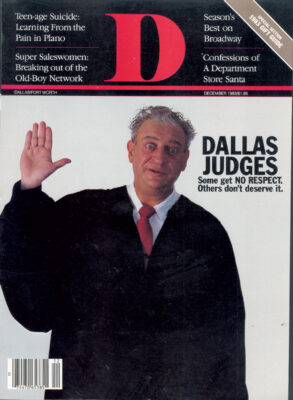THERE IS simply no such thing as a bad year for books. Movie buffs love to talk about that year of miracles, 1967, when no fewer than three excellent films were nominated for Best Picture and how sad it was that two of them-The Graduate and Bonnie and Clyde-had to lose to the eventual winner, In the Heat of the Night.
Big deal.
A year in which only three fine books could be raked from the slush pile would be a dismal year, indeed. Granted, book lovers may have to wait a while for another 1929, which saw the publication of Hemingway’s A Farewell to Arms, Faulkner’s The Sound and the Fury and Wolfe’s Look Homeward, Angel, but we shouldn’t feel that we were born too late. Like every literary year, 1983 had its pleasures for the bibliophile.
But let the reader beware: These are not the “best” books of 1983; considering the sheer number of books published in any given year (more than 40,000 in 1983), any list pretending to give us the 10 Best Books is automatically suspect. Only a computer could read that much, and computers are notorious for lacking taste.
So here are 10 good books from 1983, a year that, happily, was not much better or worse than most years. If you’re still looking for Christmas presents, books do furnish a room. Better than that, they furnish a mind.
Late Innings: A Baseball Companion by Roger Angell; Simon and Schuster, $17.50. The poet laureate of baseball is back, and the final book of his trilogy (following The Summer Game and Five Seasons) proves that Angell’s love affair with the former national pastime continues at a white heat. Angell’s books, for the rookie, are much more than stat-ridden accounts of who hit what off whom and when. He celebrates the game, at once elucidating some of its mysterious appeal and rejoicing in the knowledge that no one can ever master this game, on or off the field. Although he will dutifully chronicle strikes and salary disputes, Angell always brings us back to the diamond, where no high-priced public relations firm can help a Reggie Jackson grimly dug in against a Ron Guidry. Angell is an astute observer (who else has ever noticed that Carl Yastrzemski and many other great hitters have “strangely protuberant eyes”?) As an interviewer, he is among the best, always able to coax wisdom from players not paid for their eloquence. And Angell gives us intimations of why so many love this beautiful and demanding game:
Belonging anywhere now is terribly difficult … and the old childhood dream of realty belonging will not go away. Nothing comes closer to a band of brothers than a team, and the knowledge that athletes’ attachments to one another are transitory, sentimental, possibly homosexual and surely motivated above all by hopes of the team’s success on the field does not quite drive out the dream.
Well, that’s as good a guess as any.
Overdrive: A Personal Documentary by William F. Buckley, Jr.; Doubleday, $16.95. The publication of a new book by William F. Buckley means a celebration for some, the gnashing of teeth for others. Buckley-haters (and their name is legion) have had a field day with Overdrive, calling it self-indulgent, poorly written and boring-an unimaginable epithet for Buckley, who once said that he believed it was a sin not to entertain. Overdrive may lack some of the sparkle of its forerunner, Cruising Speed, which is also an account of several days in Buckley’s crowded life, but boring? In this journal, Buckley fires off scathing letters to Time for its investigations of his family’s problems with the SEC; eulogizes the man who, 19 years earlier, helped him start his newspaper column; wrestles with the knowledge that his dear friend and mentor, Whittaker Chambers, was for years a homosexual; and suffers the ignominy resulting from having said, in 150 newspapers, that Pat Boone showed X-rated movies at home. (He meant John Davidson.) All that happens on Monday, mind you. Boring? Spend a week with Buckley and decide for yourself.
The Love You Make: An Insider’s Story of the Beatles by Peter Brown and Steven Gaines; McGraw-Hill, $14.95. It’s rare that an “as-told-to” book succeeds; too often the participant’s mind is not well-married to the writer’s. Hence those dreadful sports biographies for children. Happily, The Love You Make is an exception. Peter Brown, a partner with the Beatles management company, worked with the group from its early Liverpool days until its breakup in 1970. Brown has teamed with Steven Gaines, biographer of evangelist Marjoe Gortner and rock singer Alice Cooper, to produce a highly readable, often poignant biography of the Beatles. Brown and Gaines are particularly adept at explaining the Beatles’ amazing synergy. Together, they made music that changed the world; separate, they never found the magic again. The Beatles made Brown rich, but he is no sycophant, though decidedly pro-McCartney in the famed Lennon-McCartney feud over the dissolution of the group and its tangled financial holdings. Brown is often merciless to George Harrison, painting him as dense and hypocritical. The Love You Make is the best source so far on the Beatles’ enigmatic manager, Brian Epstein, who was finally destroyed by the Beatles’ success, but the authors slight the contribution of George Martin, the group’s brilliant producer.
Beautiful Women, Ugly Scenes by C.D.B. Bryan; Doubleday, $16.95. If you are, were or hope to be in love, married or divorced, this novel may leave you feeling as though the author had eavesdropped on your life. “We were all like survivors of a war-survivors of the war between men and women,” says the narrator, a scarred veteran teetering on the brink of his third marriage. Cynics may condemn this book as a last flowering of Me-Decadence, and it does cloy in spots with tiring bromides about sex, power and sisterhood. But characters so vividly drawn can salvage faltering dialogue. The author of Friendly Fire tells us much about the way we live now.
Lost in the Cosmos: The Last Self-Help Book by Walker Percy; Farrar, Straus & Giroux, $14.95. If Walker Percy isn’t the most consistently provocative writer in America today, who is? Somehow, Percy combines the skills of a novelist (The Moviegoer, Love in the Ruins, Lancelot) with the mind of a philosopher-or a psycho-philosopher. Percy starts with a paradox: Why is it that we can learn more in 10 minutes about the Crab Nebula than we know about ourselves? We have been reduced to “space-bound ghosts,” Percy believes, and he finds evidence of our creeping “noughtness” in such apparently mundane matters as fashion, antiques, bogus coffee tables and our fear of speaking before crowds. “A new model of man is needed, something other than man conceived as the locus of bio-psycho-sociological needs and drives,” Percy tells us. No single book can deliver a new diagram of human nature, but Lost in the Cosmos at least hazards a preliminary sketch. If nothing else, the book will simply “blow the mind” of the reader in that good old Sixties sense, shocking us into a Zenlike openness to philosophical quandaries. Percy’s forte is his ability to treat ultimate questions in an entertaining and accessible manner. If you can imagine a Donahue show in which the host is joined by John Calvin, a Confederate general and a mysterious visitor from outer space, this may be your book.
The Feud by Thomas Berger; Delacorte Press, $13.95. Berger is best known for his Reinhart series (Crazy in Berlin, Reinhart in Love, Vital Parts and Reinhart’s Women, the latter being one of the comic masterpieces of recent American fiction). With The Feud, Berger proves that he can handle the somber, even tragic flip side of the Thirties, a decade he has staked out as uniquely his own. The feuding families are the Beelers and the Bul-lards, and their many confrontations are alternately hilarious and grim as Berger carefully renders the texture of small-town life during the Depression. Perhaps no writer around creates more vivid minor characters than Berger, who also has an uncanny ear for the cadences and clutter of everyday speech.
The Witness of Poetry by Czeslaw Milosz; Harvard, $8.95. It will come as a surprise to many readers that poetry, according to the winner of the 1980 Nobel Prize for Literature, is not an irrelevant frippery, but a vital part of a free society and a valuable barometer to the quality of life at a given moment in history. That’s the thesis of Milosz’s 1981-82 Charles Eliot Norton Lectures, which are given at Harvard. The quality of life is perilously low in these latter years of the century, says Milosz, who believes that the state of the world now is both cause and effect of the poetry now being written. “How did it happen that to be a poet of the 20th century means to receive training in every kind of pessimism, sarcasm, bitterness, doubt?” he asks. Milosz accepts the decline of the religious imagination in our time, but sees danger in Matthew Arnold’s prediction that poetry would replace religion as the wellspring of our aesthetic and moral lives. It is certainly true that almost nobody reads unassigned poetry anymore; Milosz suggests that our poets’ values, not just their styles, may be the reason.
Adventures in the Screen Trade by William Goldman; Warner Books, $17.50. Literature was once the dominant art form of our culture; movies now occupy that place. Perhaps reading a book about the movies gives us the best of both worlds. William Goldman is both novelist (Soldier in the Rain, Marathon Man, Tinsel) and one of Hollywood’s top screenwriters (Butch Cassidy and the Sun-dance Kid, All the President’s Men, A Bridge Too Far), so he’s perfectly situated to take us backstage and answer the main questions of his book: Who makes the movies? How do movies get made? The answers: (1) a bizarre gaggle of warring factions known as stars, producers, agents, directors and screenwriters; and (2) mostly by sheer luck. Goldman’s eyewitness account of the slapdash committee work that creates movies may give pause to those who revere film-making as high art. “Scratch a screenwriter and you’re bound to find horror stories,” Goldman warns, and those stories are here. Read with sickening fascination how All the President’s Men was born, how Goldman’s labors were tainted by the egotism of Carl Bernstein and the superegotism of Robert Red ford. But not all is grief: Goldman’s explanation of why movies require Believabili-ty over Reality will educate any moviegoer. However, his practical tips on screenwriting may not be for the general reader-and even aspiring screenwriters may aspire less diligently after this glimpse of real life in the screen trade.
Lead Time: A Journalist’s Education by Garry Wills; Doubleday, $18.95. Lead time -the period that elapses between a story’s assignment and its appearance in print-gives Garry Wills the title for this collection of articles and reviews written between 1968 and 1982. Wills was a mainstay of Esquire during its most recent heyday, the mid-Seventies, but most of these reprinted pieces hold up very well today. That’s because Wills has the gift of putting ephemeral political events into historical perspective. His stories on Watergate, his account of being arrested at a peace march and his incisive look at Jerry Brown, the mystic as politician -these illuminate the dark areas left when the beat reporters and television crews departed the scene. And Wills is readable, despite a decade’s lead time, for another reason. He is a stylist in awesomely full command of the language: “We must move backward and forward in time simultaneously to get a fix on anything knowable. Caught in the flux of things, we can still partially chart our course, stand outside and above the flux to that extent, both participants and critics.” As Wills the former Jesuit might put it, quod est demonstrandum.
The Only Living Witness by Stephen G. Michaud and Hugh Aynesworth; Linden Press, $15.95. On a bloody rampage through five states, Theodore Bundy may have killed as many as 30 women. He certainly killed two Florida college students and crippled two others in a savage, methodical attack on their sorority house. Aynesworth taped hundreds of hours of conversations with Bundy on Death Row, convincing the accused killer to talk in a hypothetical, third-person manner about the crimes. Stopping short of a confession, Bundy speaks with chilling detachment of “this person,” “the disordered self who committed the murders. This fully documented account of obsession and slaughter may leave the reader wondering what words like “psychotic” mean when they are applied to Ted Bundy, an articulate former law student who, some thought, might have had a career in politics. This book should stand as a classic study of the criminal mind.
Get our weekly recap
Brings new meaning to the phrase Sunday Funday. No spam, ever.
Related Articles

Media
Will Evans Is Now Legit
The founder of Deep Vellum gets his flowers in the New York Times. But can I quibble?
By Tim Rogers

Restaurant Reviews
You Need to Try the Sunday Brunch at Petra and the Beast
Expect savory buns, super-tender fried chicken, slabs of smoked pork, and light cocktails at the acclaimed restaurant’s new Sunday brunch service.

Arts & Entertainment
DIFF Preview: How the Death of Its Subject Caused a Dallas Documentary to Shift Gears
Michael Rowley’s Racing Mister Fahrenheit, about the late Dallas businessman Bobby Haas, will premiere during the eight-day Dallas International Film Festival.
By Todd Jorgenson


